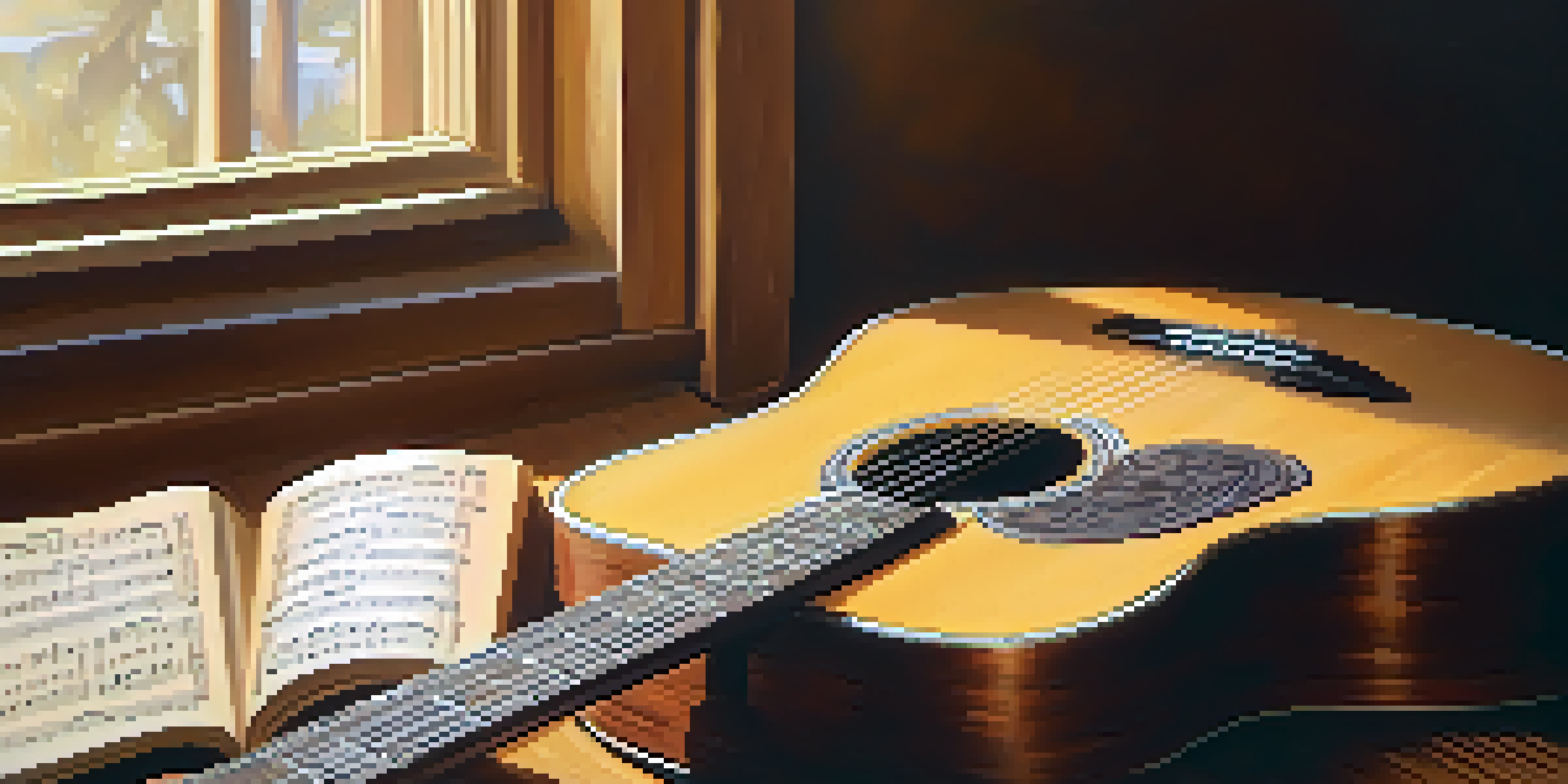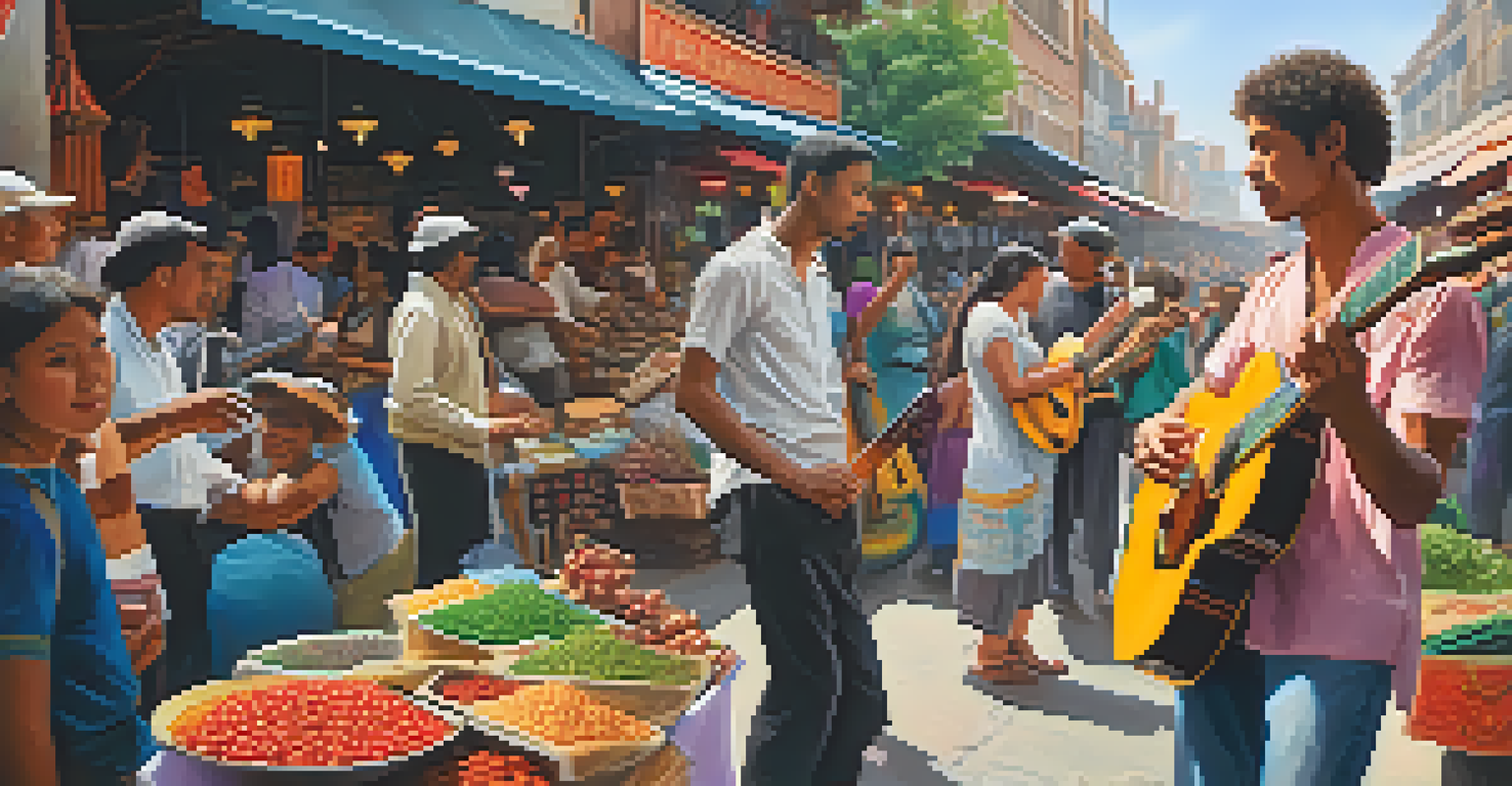Cultural Melodies: Guitar's Influence on Identity

The Guitar: A Universal Instrument of Expression
The guitar has transcended borders, becoming a symbol of musical expression worldwide. From the streets of Spain to the blues bars of Chicago, its versatility allows it to adapt to various musical genres. This adaptability has made the guitar a preferred choice for many artists seeking to convey their unique cultural narratives.
The guitar is a powerful instrument of cultural expression, capable of transcending borders and connecting people from diverse backgrounds.
With its rich tones and dynamic range, the guitar can evoke emotions that resonate deeply within listeners. Whether it’s the flamenco rhythms of Andalusia or the soulful strums of a folk singer, the guitar speaks a universal language that connects people across different backgrounds. It serves as a bridge between cultures, sharing stories and experiences through sound.
As artists embrace the guitar, they often infuse it with their cultural heritage, creating a powerful fusion of styles. This blend not only enriches the music but also solidifies the guitar's role in shaping cultural identities, making it a vital instrument in the world of music.
Cultural Identity Through Musical Styles
Different cultures have unique ways of incorporating the guitar into their music, which plays a significant role in shaping cultural identity. For instance, in Latin America, the guitar is often featured in genres like mariachi and bossa nova, where it becomes a key component of cultural celebrations. This connection to music helps reinforce community ties and shared heritage.

In contrast, the American folk scene utilizes the guitar to tell personal and collective stories, reflecting the struggles and triumphs of its people. Artists like Woody Guthrie and Joan Baez used the guitar as a tool for social change, intertwining their identities with their music. This illustrates how the guitar can serve not just as a musical instrument but as a powerful voice for cultural expression.
Guitar as a Cultural Connector
The guitar transcends cultural boundaries, serving as a universal instrument that expresses diverse identities and stories.
The evolution of guitar styles within cultures also showcases a dialogue between tradition and innovation. As musicians experiment with different techniques and sounds, they create new genres that redefine cultural boundaries, reinforcing the idea that identity is a fluid and dynamic construct.
The Guitar's Role in Social Movements
Throughout history, the guitar has played a pivotal role in various social movements, becoming an emblem of resistance and change. In the 1960s, for example, the folk music revival in the U.S. was heavily influenced by the guitar, with artists using their craft to address issues like civil rights and war. The simplicity of the guitar allowed for powerful messages to be delivered in a relatable way.
Music is the universal language of mankind, and the guitar is one of its most eloquent voices.
The power of the guitar extends beyond simple melodies; it can inspire action and unify people around a common cause. Songs written during turbulent times often resonate with a sense of identity and purpose, with the guitar providing a soundtrack to social change. This connection reinforces the idea that music, particularly guitar music, can shape and reflect societal values.
Moreover, contemporary movements continue to harness the guitar's influence. Artists across the globe are using their music to advocate for various causes, from environmental issues to social justice, proving that the guitar is not just an instrument but a catalyst for cultural identity and activism.
Fusion Genres: Blending Cultures Through Guitar
In recent years, the rise of fusion genres has illustrated the guitar’s capacity to blend diverse musical traditions. Genres like reggae-rock, flamenco-jazz, and world music incorporate the guitar in innovative ways, creating unique soundscapes that reflect a melting pot of cultural influences. This fusion not only broadens musical horizons but also celebrates the interconnectedness of identities.
For many musicians, exploring fusion genres allows them to pay homage to their roots while also embracing new influences. This act of musical exploration can lead to the creation of sounds that resonate with a wider audience, fostering appreciation for different cultures. The guitar becomes a tool for collaboration and creativity, breaking down barriers between genres.
Music's Role in Social Movements
Throughout history, the guitar has been a powerful tool for social change, uniting people around common causes through its melodies.
Through fusion, the guitar also tells stories of migration and cultural exchange. As artists travel and collaborate, they leave behind traces of their identities, enriching the global music landscape with hybrid sounds that reflect shared experiences and histories.
Personal Narratives: The Guitar as a Voice
For many musicians, the guitar serves as a personal diary, allowing them to express their innermost thoughts and experiences. This intimate connection between the artist and their instrument often leads to songs that resonate deeply with listeners, creating a shared sense of understanding. The guitar becomes a voice for those who may feel unheard in society.
Through personal narratives, musicians can explore themes of love, loss, and identity, often reflecting broader cultural experiences. For example, a singer-songwriter may weave their cultural background into their lyrics, using the guitar to narrate their journey. This storytelling aspect of music strengthens the bond between the artist and their audience, highlighting the guitar's role in cultural expression.
Additionally, the emotional weight carried by guitar music can evoke powerful memories and sentiments in listeners. As people connect with these stories, they often find their own identities reflected in the music, proving that the guitar is not just an instrument but a vessel for collective memory and shared experiences.
Educational Impact: Teaching Culture Through Guitar
Education plays a crucial role in preserving cultural identity through the guitar. Music programs around the world often incorporate traditional guitar styles, teaching students not just how to play but also the cultural significance behind the music. This educational approach fosters an appreciation for diversity and encourages the exploration of cultural roots.
By learning different guitar styles, students gain insights into the histories and traditions of various communities. For instance, studying the classical guitar can introduce learners to Spanish culture, while exploring blues can connect them to African American heritage. This understanding cultivates a sense of respect and curiosity about different cultures, enriching their musical journey.
Education Preserves Cultural Heritage
Music education fosters appreciation for cultural diversity by teaching traditional guitar styles, connecting students to their roots.
Moreover, educational initiatives often encourage collaboration among students from diverse backgrounds, allowing them to share their unique perspectives. This interaction not only enhances musical skills but also promotes camaraderie and cultural exchange, illustrating how the guitar can serve as a tool for unity in a multicultural world.
The Future of the Guitar in Cultural Identity
As we look to the future, the guitar will undoubtedly continue to evolve alongside cultural identities. With advancements in technology and the rise of global connectivity, musicians are more able than ever to share their unique sounds and stories. This accessibility has the potential to create new genres and movements that reflect the changing landscape of cultural identity.
Furthermore, the resurgence of interest in traditional music among younger generations is bringing the guitar back to its roots. Many young musicians are exploring their heritage and incorporating traditional techniques into their work, ensuring that cultural legacies endure. This revival emphasizes the importance of the guitar as a symbol of cultural pride and continuity.

Ultimately, the guitar's influence on identity is a testament to its power as a tool for expression and connection. As cultures continue to intersect and evolve, the guitar will remain an integral part of this narrative, shaping and reflecting the ever-changing tapestry of human experience.